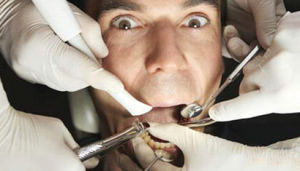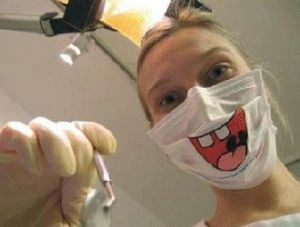 If before in the arsenal of the dentist there were intimidating metal tweezers, knives and other tools, today the cabinet of a modern dentist is equipped with innovative equipment of the latest generation.
If before in the arsenal of the dentist there were intimidating metal tweezers, knives and other tools, today the cabinet of a modern dentist is equipped with innovative equipment of the latest generation.
But, despite this, most patients of the doctor's office feel an overwhelming fear. Earlier, dental treatment resembled a test, and from one type of dental chair, a shiver ran through the body, and today any manipulations are performed using anesthesia, and the physician directs all efforts to perform the treatment without pain.
If you drip into the past, earlier only in the case of tooth extraction the doctor resorted to using anesthetic injections, any other manipulations for curing the teeth were carried out on live.
One way or another, most patients in the dental office doubt how painless the doctor will work with his aching teeth, as a result of such fears, even a phobia can form.
Such an overwhelming fear of a dentist is called dentophobia, dentofobia or odontophobia.
And if a person is no longer able to distinguish a phobia from a simple fear, one must immediately get rid of it.
Contents
- Interesting statistical facts
- Anxiety, fear and phobia. ..
- Varieties of phobic state
- Why does dentists fear?
- Help to the dentofob
- Still afraid?
Interesting statistical facts
Related facts:
- Two percent of the population of the country did not visit the dentist once.
- Every tenth person studied felt the strongest fear of the dentist's chair, most often they were representatives of the weaker sex.
- In most cases, the cause of phobia is the past negative experience of treatment.
- In 90% of cases, positive results of dental treatment in childhood prevent the possibility of developing a phobia in the future.
- As a rule, ineffective sedation is justified not only by the fear of pain, but also by the premature irrational intake of anesthetics in combination with alcoholic beverages.
Anxiety, fear and phobia. ..
Dentobobia is an irrational and unsupported panic fear of dentists and any procedures for dental treatment, the  is accompanied by physical and psychological reactions of a person.
is accompanied by physical and psychological reactions of a person.
As a rule, people with such a phobia seek help from the dentist only in the most neglected cases of dental disease.
Before that, a person tries in every possible way to overcome the root of the problems, resorting to the help of folk medicine and the advice of the surrounding people. The result of such home treatment always leads to complications such as pulpitis, gum disease, extensive caries.
Species of the phobic state
After conducting a series of studies, the specialists came to the conclusion that there are three types of dentofobia:
- Congenital phobia, the most rare form of insuperable fear of all kinds of procedures with teeth. Congenital dentofobia occurs before any medical procedure, expressed by an excessive negative attitude towards them.
- Acquired form of phobia, which is the most common phobia in front of the dentist's office. The causes of this phenomenon can be past failures and unpleasant experience of dental treatment. The phobia is characterized by a stable stable character of manifestation and bright symptoms.
- Imaginary dentofobia occurs most often in people of different ages who have not previously visited the dentist's office. Full-fledged fear is really based on a turbulent imagination that is not backed by any facts. To stop fearing dentists in this case is the easiest, this kind of phobia is easily cured, since it is easier to level the far-fetched opinion. After visiting a qualified dentist and a painless successful treatment, the phobia recedes. Symptoms of unreasonable dentofobia:
- is a panic alarm;
- increased muscle tension;
- full refusal of contacts and consultations of the doctor;
- does not control the actions;
- headache of varying intensity;
- disturbed heart rhythm, blood circulation problems( frequent palpitations, abnormalities in blood pressure, etc.);
- digestive and gastrointestinal disorders( vomiting, diarrhea, colic, non-control of urination);
- dilated pupils of the eye, which is unjustified( mydriasis);
- loss of consciousness or a presyncope;
- feeling of helplessness and inability to control the situation;
- excessive sweating.
As the experience of the past shows, many potential clients of dental offices were denied treatment, despite the fact that they had a full dentofobia.
Even such an important procedure as prosthetics after the loss of teeth, patients were not conducted as a result of an insurmountable fear of the chair of the dentist.
As a result, the person's unpresentable appearance significantly influenced his social adaptation. Today people with such a problem in any case get qualified help to get rid of dentofobia.
Why does dentists fear?
 First of all you need to understand that you can not lose sight of any fears. Sooner or later, the usual fear of treating teeth can develop into a stage of phobia, which is much harder to eradicate.
First of all you need to understand that you can not lose sight of any fears. Sooner or later, the usual fear of treating teeth can develop into a stage of phobia, which is much harder to eradicate. It is necessary in every possible way to drive out anxious thoughts about the fact that in the office of a dentist a person will necessarily be hurt.
Today in the assortment of dentist's tools there are all necessary items and equipment for comfortable painless treatment.
Even the slightest tooth decay can be eliminated by a doctor using anesthesia, if manipulation with the tooth will hurt the visitor.
You can eliminate a phobia if you know the reasons for its occurrence.
- The causes of acquired by phobia before dentists can be such things as early negative experience with contacts with a doctor, hypochondria, acquired mental illness.
- The causes of congenital type dentofobia can be any intrauterine pathological development of the fetus, resulting in disturbances in metabolism and production of serotonin and norepinephrine, as well as fear of blood, low pain threshold, predisposition of the genetic type, pathology of the psyche.
- The reasons for the of the imaginary dentofobia were negative responses about doctors from the media, negative emotions from the sounds of dentists' equipment, mistrust of doctors, fear of pain and any actions in the oral cavity, neglected pathologies of dental diseases, intimidation in childhood by a doctor.
No need to delay the trip to the doctor until the pain becomes debilitating. If a person has noticed the slightest manifestations of caries, pain and other problems in the oral cavity, a timely trip to the doctor will quickly and easily cure the disease at the initial stage.
Tightening the simple caries to the hardest pulpitis, the patient condemns himself to a long complicated course of treatment, the resulting consequences of such a disease can lead to even a tooth loss.
Another common reason for fearing dentists is the terrible stories from surrounding people about how hard and painfully they were treated, and what a ruthless doctor they got. In fact, an isolated case can not be the basis for inferences and conclusions. Most likely, the person has got to the incompetent doctor or in clinic with a low level of qualification.The correct choice of a hospital and a doctor is a predetermining component of successful dental treatment without pain and fears.
Assistance to the dentofob
Specialists and psychologists strongly recommend to adhere to the following recommendations to those people who are unreasonably afraid of the dentist:
- It should be understood that in any case of dental disease should be treated with .Timely assistance to the dentist can be quick,
 painless and does not involve a number of consequences.
painless and does not involve a number of consequences. - Insurmountable fear must be eradicated in the psychologist's office of , if independent efforts and work on oneself did not bring any results.
- The correct choice of the clinic will help to avoid any unpleasant sensations during the procedures. It will be useful to first look for information about harmless and effective analgesics, as well as on the best methods of treatment of dental diseases.
- Before proceeding to treatment, needs to establish communication and create a favorable atmosphere with the dentist .Visiting the same doctor will eradicate any fears and phobias.
- Before visiting the dentist's office, needs to find all possible causes of fears and stress and eradicate their .To do this, it is better to know in advance how the treatment will be carried out, to prepare for the whole process ahead.
- An important aspect of successful tooth treatment is the favorable atmosphere and the environment of the clinic. Comfort and absence of smells of medicines, smiles of staff and goodwill can overcome even a phobia.
Still afraid to treat my teeth, what to do, - the expert answers:
Still afraid?
In the case where dentofobia is not amenable to treatment, a patient may be offered sedation.
 Sedation is a state of rest when the visitor of the clinic is immersed in a superficial dream, any manipulation of the teeth does not bring him any painful sensations, and at the end of the treatment a person does not remember anything happening during this period of time.
Sedation is a state of rest when the visitor of the clinic is immersed in a superficial dream, any manipulation of the teeth does not bring him any painful sensations, and at the end of the treatment a person does not remember anything happening during this period of time. In other cases it is worthwhile to understand that the times of visiting the torture dental chair have passed. Now, any work with the teeth takes place under anesthetic preparations, and the newest equipment in every way simplifies the treatment processes.
In order to overcome the dentofobia inside, a person needs to visit a doctor as often as possible. After choosing a clinic and a qualified doctor, regular receptions to it with positive results will destroy any fears, even phobias.
Any dentist cares about his reputation and the prestige of the clinic, so he will make every effort to ensure that his patients do not feel pain and negative emotions.
